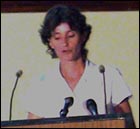ICRC course for senior army NCOs
[TamilNet, Monday, 11 June 2001, 18:53 GMT]
 |
| Ms.Isabelle Barras, head of the delegation, ICRC, Colombo. (ICRC Photo) |
"The Law of Armed Conflict (LOAC) is an attempt by nations to establish certain minimum standards of conduct for parties to an armed conflict, in order to prevent or at least reduce the suffering of the victims.
It does not ask the military to implement impossible rules, instead it does urge them to carry out their mission weighing carefully both the military and humanitarian factors," said Ms. Isabelle Barras, Head of delegation, ICRC Sri Lanka, at the opening ceremony of a training seminar on international human law / Human Rights for senior Non- Commissioned Officers (NCO's) at the Sri Lanka Foundation Institute, in Colombo this morning.
The commander of the Sri Lanka army, Lieutenant General L.P. Balagalle, and the Vice Chancellor of the Colombo University, Ms. Savithri Gunasekera were also present at function.
"Close co-operation between the SLA and ICRC in promoting knowledge and compliance with the LOAC, commenced in 1989, with the opening of a permanent ICRC office in Sri Lanka. Tremendous achievements have been made ever since and, today, the teaching of rules for behaviour in combat to military personnel has become a key feature of the SLA training directives," said head of the ICRC delegation in Sri Lanka.
 |
| Dr.Sunil Fernando, Dissemination Officer, ICRC Colombo, lecturing on the LOAC. (ICRC Photo) |
The 2 week course has been initiated by the SLA Directorate of Humanitarian Law, and supported by the ICRC, and the Human Rights Center of the University of Colombo. Sixty senior NCO's from various units of the SLA are participating in the course.
The Commander of the SLA, Lieutenant General L.P. Balagalle, in his address said that although violations of human rights occurred in the past, today the SLA was fully committed to the protection of Human Rights and cited examples such as the setting up of the SLA Directorate of Humanitarian Law and establishment Human Rights Cells to monitor violations that occur on the field.












